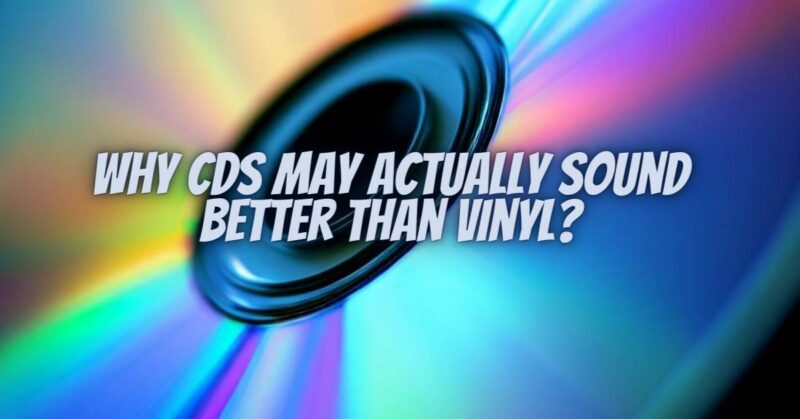The debate between vinyl records and CDs (Compact Discs) has been ongoing for decades among audiophiles and music enthusiasts. Vinyl records are celebrated for their warm and analog sound, while CDs are often considered a more precise and convenient format. In recent years, there has been a growing interest in exploring whether CDs may, in fact, offer superior sound quality to vinyl records. In this comprehensive article, we will delve into the various factors that contribute to this debate and examine why CDs may actually sound better than vinyl in certain contexts.
- Digital vs. Analog Audio:
CDs are a digital audio format, which means that they store music as a series of binary code, translating to precise and lossless audio reproduction. Vinyl records, on the other hand, are analog. Analog audio is susceptible to various imperfections, such as surface noise, groove wear, and rumble, which can affect sound quality.
- Noise and Distortion:
Vinyl records are susceptible to noise and distortion due to imperfections in the recording process, pressing, and playback. These imperfections can introduce pops, clicks, and surface noise that may detract from the overall listening experience. CDs, being digital, are free from such analog-specific artifacts.
- Dynamic Range and Clarity:
CDs offer a wide dynamic range and exceptional clarity, allowing for the faithful reproduction of both subtle and intense musical passages. Vinyl records have limitations in dynamic range due to the physical constraints of the medium, potentially compressing and distorting complex musical passages.
- Frequency Response:
CDs provide a flat and consistent frequency response across the entire audio spectrum. Vinyl records may exhibit frequency limitations, especially in the high and low ends, which can affect the accuracy of the reproduced sound.
- Consistency and Reproducibility:
CDs are highly consistent and reproducible. Each CD of the same album sounds virtually identical, ensuring a standardized listening experience for all listeners. Vinyl records can exhibit variations in sound quality between pressings, leading to potential inconsistencies.
- Durability and Longevity:
CDs are more durable and less prone to wear and tear compared to vinyl records. Vinyl records can degrade over time due to repeated playback, resulting in a gradual loss of sound quality.
- Convenience and Accessibility:
CDs offer greater convenience and accessibility due to their digital nature. They can be easily ripped, copied, and played on a wide range of devices, including computers, smartphones, and dedicated CD players. Vinyl records require specialized equipment and care in handling.
- Mastering and Production Quality:
The mastering and production quality of a CD can significantly impact sound quality. Well-mastered CDs can offer exceptional clarity and detail. Vinyl records may be subject to mastering and production choices that affect their sound.
- Noise and Interference:
Vinyl records are susceptible to external noise and interference, such as dust, static, and vibration, which can introduce additional artifacts during playback. CDs are immune to these environmental factors.
- Format Flexibility:
CDs can store digital music in various formats, including uncompressed PCM, lossless formats like FLAC, and compressed formats like MP3. This flexibility allows users to choose the level of audio quality that suits their preferences and storage constraints.
While vinyl records undeniably possess a unique charm and analog warmth that appeals to many audiophiles, it’s important to recognize that CDs offer distinct advantages in terms of sound quality, consistency, and convenience. The debate between CDs and vinyl should not be reduced to a one-size-fits-all conclusion, as both formats have their merits and are appreciated by different segments of the audiophile community.
In certain contexts, such as precise audio reproduction, dynamic range, and freedom from analog artifacts, CDs may indeed provide a superior listening experience to vinyl records. However, it’s essential to acknowledge that audio quality is subjective, and personal preferences play a significant role in the vinyl vs. CD debate.
Ultimately, the choice between CDs and vinyl should be based on individual preferences, audio equipment, and the specific listening experience one seeks. Both formats have their place in the world of music appreciation, and each offers a unique sonic journey that resonates with different audiences.


